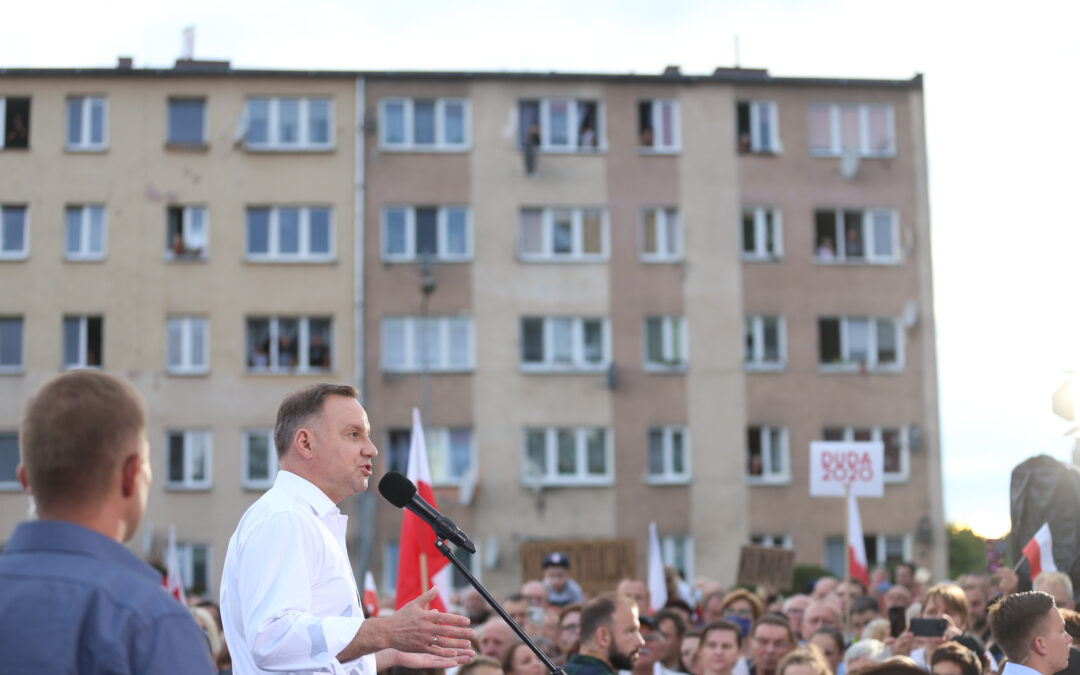Foreign correspondents who cover Poland for leading international publications have published a joint statement condemning recent criticism of a German journalist by President Andrzej Duda.
The 30 signatories – who represent publications from nine different countries, including the Financial Times, Le Monde, De Volkskrant, Le Soir and the Guardian – “express their deep concern regarding the attack on our respected colleague from Die Welt, Philipp Fritz”.
In their statement, which is printed below in full, they say that Fritz has “received thousands of threatening messages” after he was named by Duda as being part of a German conspiracy against him.
The incident in question occurred at one of the president’s election rallies on 3 July. He claimed that Germans were seeking to prevent him from being re-elected and to instead install his opposition rival, Rafał Trzaskowski, as president.
“The Germans want to choose the president in Poland,” said Duda. His words referred in part to a German- and Swiss-owned Polish newspaper that had published details of a convicted child sex abuser whom Duda had pardoned.
But the president also turned his attention to Fritz, identifying him as part of a “ruthless, dirty campaign against me” during which I have been “brutally, falsely, slanderously attacked”.
“Today we have another instalment of the German attack in these elections,” said Duda. “The Warsaw correspondent of Die Welt, Mr Fritz, reports that Mr Trzaskowski would be a better president for Germany because he is opposed to Poland getting war reparations from the Germans.”
The president’s words referred to an article published by Fritz earlier that week, in which he wrote that, if Trzaskowski won the presidency, he could “strike a less confrontational tone in relations with Germany”.
One reason for this was that Trzaskowski is “sceptical” about the idea of Poland seeking war reparations from Germany, something that Duda has called for but which, Fritz wrote, “can quickly poison relations”.
After Duda’s speech, the editor-in-chief of Die Welt, Ulf Poschardt, came out in defence of his journalist, saying that the newspaper had put “one of our best correspondents in Warsaw, because Poland is an important country for us in Europe”.
“This type of intimidation is out of the question,” wrote Poschardt, quoted by Gazeta.pl. “Let’s quickly return to civilised discourse.”
“The current government in Warsaw has not only put pressure on the Polish judicial system in an unacceptable way, but is also trying to do so against the media,” he added.
In response, Poland’s state broadcaster, TVP, which is under the influence of the government and was used to support Duda’s re-election campaign, ran a news segment entitled “German interference in the Polish elections”.
The report accused “German media of standing on one side of the barricades” in Poland, using “manipulations” to attack President Duda.
It named and showed an image of Fritz, alongside a commentator saying that German foreign correspondents have a “long tradition” of performing a “double role” of reporting news while also representing their country’s “national interest”. TVP’s presenter also condemned Poschardt’s “scandalous behaviour”.
Meanwhile, Poland’s foreign ministry summoned the chargé d’affaires from the German embassy to discuss what it said was “a series of articles in German media” containing “manipulations and creating the impression of engagement on the side of one of the candidates in Poland’s presidential election”.
Below we publish the statement from foreign correspondents who cover Poland and the names of the signatories.
As foreign correspondents and editors in Poland, we hereby express our deep concern regarding the attack on our respected colleague from daily newspaper Die Welt, Mr. Philipp Fritz. We firmly believe in press freedom and open dialogue as cornerstones of public discourse. The singling out of Mr. Fritz by President Andrzej Duda during a televised rally amounts to a direct assault on those values.
In the following days, Mr. Fritz received thousands of threatening messages. Public channel TVP1 similarly targeted him on the evening news programme Wiadomości. This statement serves as an expression of solidarity with our colleague.
***
Jako zagraniczni korespondenci i wydawcy w Polsce wyrażamy niniejszym nasze głębokie zaniepokojenie wynikające z ataku na naszego szanowanego kolegę, korespondenta dziennika “Die Welt”, Philippa Fritza. Niezłomnie wierzymy w wolność mediów i w otwarty dialog jako podstawę publicznego dyskursu. Wskazanie na pana Fritza przez prezydenta Andrzeja Dudę przed telewizyjnymi kamerami podczas kampanii prezydenckiej jest równoznaczne z bezpośrednim atakiem na te wartości.
W kolejnych dniach pan Fritz otrzymał tysiące gróźb. Telewizja publiczna TVP1 w głównym wydaniu „Wiadomości” w podobny sposób posłużyła się jego nazwiskiem. Niniejsze oświadczenie jest wyrazem solidarności z naszym kolegą.
Signed/Podpisani:
Meret Baumann (NZZ, Switzerland)
Matthias Benz (NZZ, Switzerland)
Michiel van Blommestein (Freelance, the Netherlands)
Olaf Bock (ARD, Germany)
Juliette Bretan (Freelance, UK)
Eldorados Butrimas (Lietuvos Rytas, Lithuania)
Claudia Ciobanu (Balkan Insight, Romania)
Gulliver Cragg (France24, France/UK)
Christian Davies (The Guardian, UK)
Matthew Day (Freelance, UK)
Thomas Dudek (Cicero Magazin, Germany)
Roman Fillinger (SRF, Switzerland)
Moritz Gathmann (Cicero Magazin, Germany)
Gerhard Gnauck (Frankfurter Allgemeine Zeitung, Germany)
Oliver Hinz (Katholische Nachrichten-Agentur, Germany)
Jenne Jan Holtland (De Volkskrant, the Netherlands)
Jakub Iwaniuk (Le Monde, France)
Florian Kellermann (Deutschlandradio, Germany)
Tomasz Kurianowicz (Berliner Zeitung, Germany)
Gabriele Lesser (Die Tageszeitung/Der Standard, Germany/Austria)
Jens Mattern (Kurier, Austria)
Ivo Mijnssen (NZZ, Switzerland)
Sarah Nowotny (SRF, Switzerland)
Lukáš Onderčanin (SME, Slovakia)
Ekke Overbeek (Trouw, the Netherlands)
Jan Pallokat (ARD, Germany)
Peter Sawicki (Deutschlandradio, Germany)
James Shotter (Financial Times, UK)
Romain Su (Le Soir, Belgium/France)
Shaun Walker (The Guardian, UK)
Main image credit: Cezary Aszkielowicz / Agencja Gazeta

Daniel Tilles is editor-in-chief of Notes from Poland. He has written on Polish affairs for a wide range of publications, including Foreign Policy, POLITICO Europe, EUobserver and Dziennik Gazeta Prawna.




















